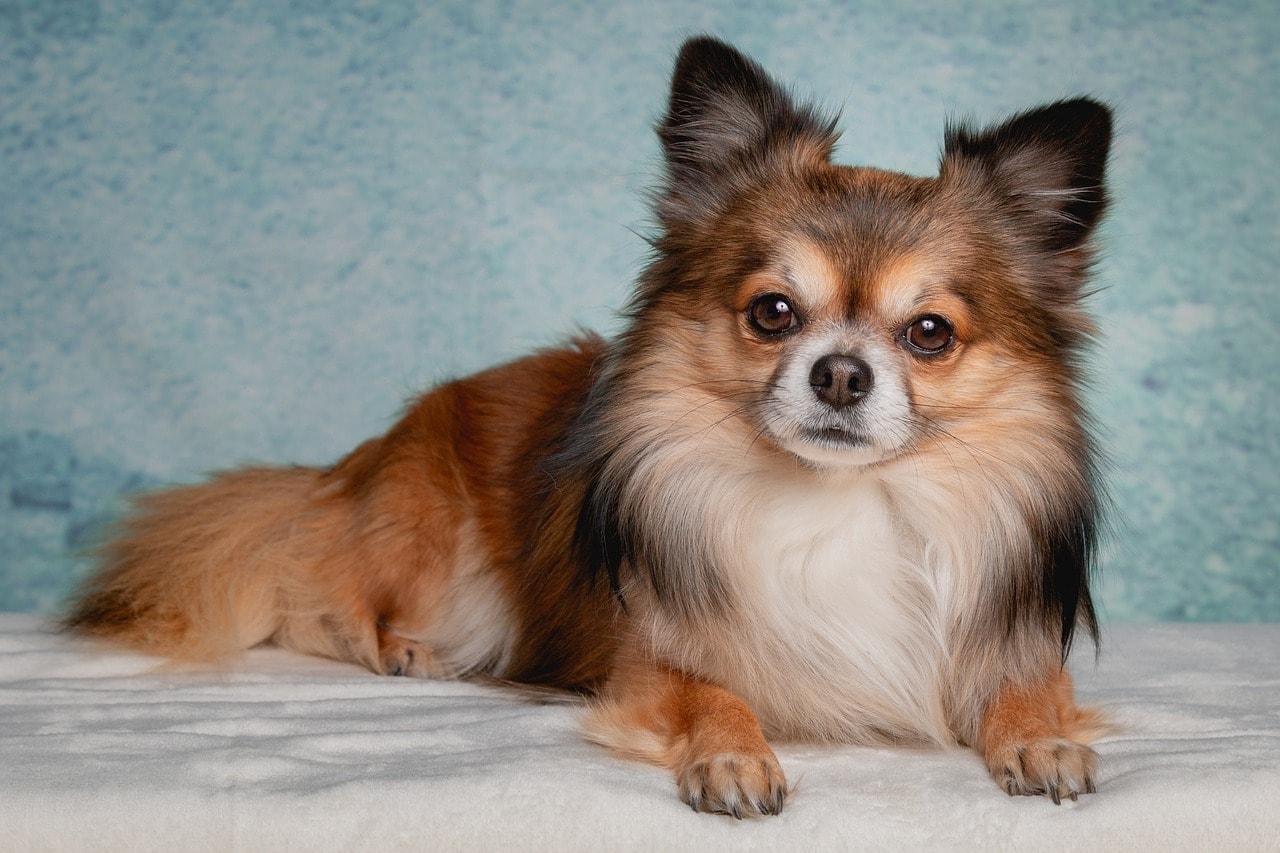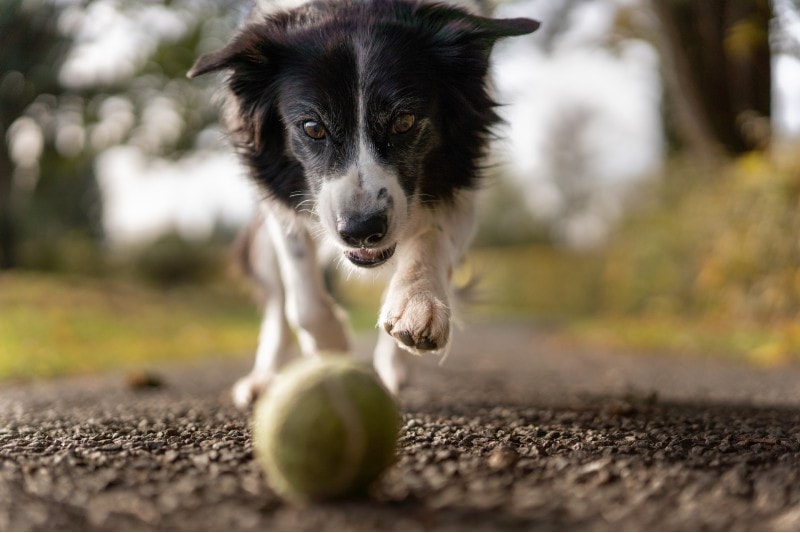Do Boston Terriers Have Tails? Vet-Reviewed Breed Characteristics & Facts

Updated on
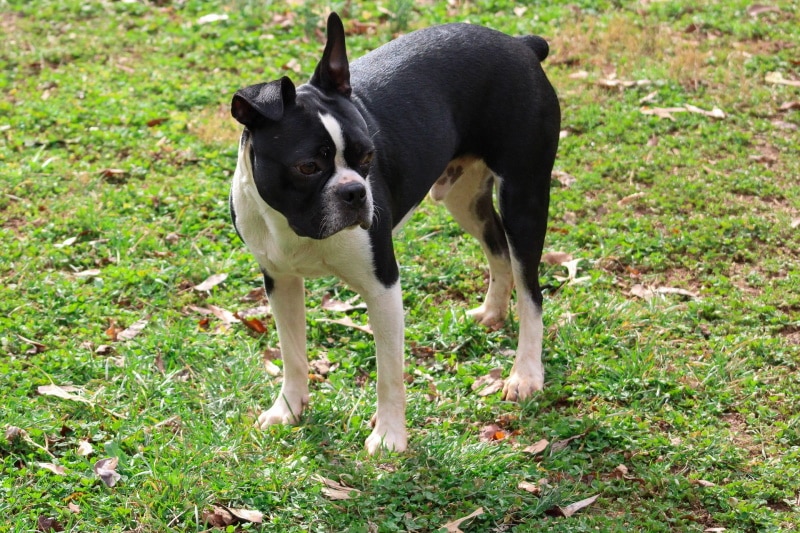
Click to Skip Ahead
The Boston Terrier is an American dog breed originating from the city of Boston, Massachusetts. It is a small breed that is known for its friendly and loyal temperament. They are easily recognizable by their tuxedo-like coat and short, square muzzle. Boston Terriers are intelligent and eager to please, making them an ideal companion for families. But do they have tails? The simple answer is yes, Boston terriers are born with tails! Keep reading to understand why you might not see many around with tails.
The simple answer is yes, Boston terriers are born with tails. However, they aren’t born with a long tail, as their short tails are due to a genetic mutation found within the breed. Keep reading to understand why you might not see many around with tails.
Boston Terrier Breed History
The Boston Terrier is a beloved breed that has been around for over a century. As is typical of many breeds, the Boston Terrier began as a variation of a mixed breed of dogs, with the Bulldog and the English White Terrier being the most prominent ancestors.
They were first referred to as “Round Heads” or “Bull Terriers” before they were given their formal name of Boston Terrier in the late 19th century. The breed was so popular in the Boston, Massachusetts area that it quickly became known as the “Boston Bull”. These feisty terriers were originally bred in the late 1800s to be fighting dogs. Breeders wanted a dog that was strong and intimidating, but also friendly and loyal.
However, as the breed sort of gained traction, their purpose shifted away from fighting and towards companionship. This is why they’re known for their friendly and gentle temperaments, combined with great intelligence.
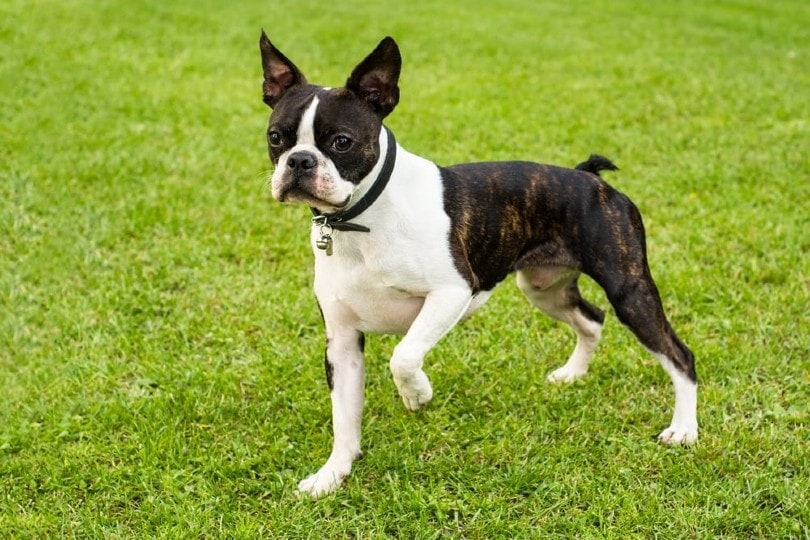
Do Boston Terriers Have Tails?
Yes. However, Boston Terriers are born with short tails or a stumpy, corkscrew-like tail. This is due to a naturally occurring genetic mutation in the breed. A Boston Terrier born with a long tail would not be able to be registered as a Boston Terrier for most canine registries; however, the dog would otherwise not have any issues due to the presence of a long tail.
Breed Temperament
The Boston Terrier breed has a unique temperament that has been described as both lively and friendly. These dogs are known for their outgoing personalities and are actually considered to be one of the most personable breeds of dog. They’re known to be loyal and affectionate, making them great companions. The terrier loves to play and socialize, and they get along well with both humans and other animals.
Boston Terriers are also considered to be one of the most intelligent breeds, and they are relatively easy to train. They need plenty of mental stimulation and exercise to stay healthy and content. They’re fairly adaptable to most lifestyles and are usually content in an apartment setting. However, they also have a tendency to bark and can be territorial.
They require patience and consistency in terms of training, but they are eager to please. With proper care and attention, they can make wonderful additions to any family. They respond well to positive reinforcement and daily consistency – and it’s best to start training when young.
More About the Boston Terrier
Exercise Requirements
Terriers are an active breed, and they require plenty of exercise and stimulation. They are best suited for households where there is an active lifestyle and plenty of activities to keep them busy. Exercise should include at least 30-40 minutes of walking or running every day, along with other activities such as fetch, agility, and swimming.
Swimming is a great way to provide exercise for terriers, and they anecdotally seem to enjoy the activity a great deal! Mental stimulation is also important for this breed, and can include interactive toys, puzzle games, and agility courses. In general, Boston Terriers should get at least 60 minutes of physical and mental exercise per day.
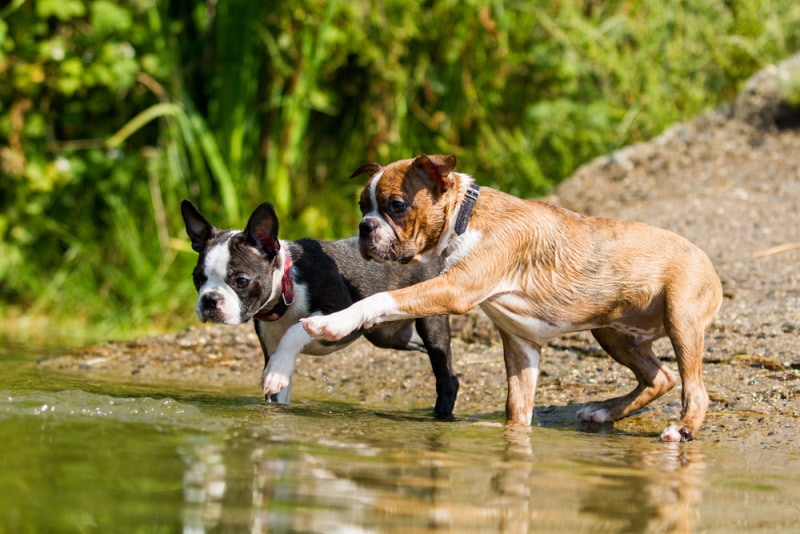
Diet & Nutrition
Like with any other dogs, Boston Terriers need high-quality dog food. This can be in the form of a commercial option, or it can be a home-made diet prepared with your veterinarian’s supervision and approval. It is important to keep in mind that your dog’s dietary needs will change throughout their life. As such, their diet should cater to their life stage (puppy, adult, or senior) and should also factor in other things such as:
- Their current weight and body condition score (your veterinarian can help assess this)
- Their reproductive status
- Their level of activity
- Their health status
- The purpose of the diet (weight loss, weight gain, or maintenance)
If you’re in doubt about your pet’s diet and nutrition, it’s best to consult your veterinarian for more information.
Boston Terriers are prone to getting overweight; therefore, you should pay attention to and periodically check your pup’s weight. Treats are very useful in terms of a training aid; however, they are often high in calories and can quickly lead to an overweight pet, especially if they’re able to easily solicit treats from you. If you’re concerned about your pet’s weight or the amount of treats they’re being offered, you should discuss the matter with your veterinarian.
Like all dog breeds, Boston Terriers require access to fresh, clean drinking water at all times. It’s best to offer them water ad libitum, or in an unlimited amount, allowing your pet to have a drink whenever they feel like it.
Training & Socialization
Training and socialization are important aspects of a healthy lifestyle for any dog, including Boston Terriers. It helps them learn how to interact with humans and other animals, as well as build their confidence and self-control. It’s important to start training early and be consistent. Terriers need to be taught basic obedience commands, such as sit, stay, come, and heel, but they also need to be socialized properly. This means introducing them to other animals and people and teaching them how to behave appropriately in different situations. Overall, socializing and obedience training should be done in a positive and rewarding way, with rewards for good behavior and patience for mistakes.
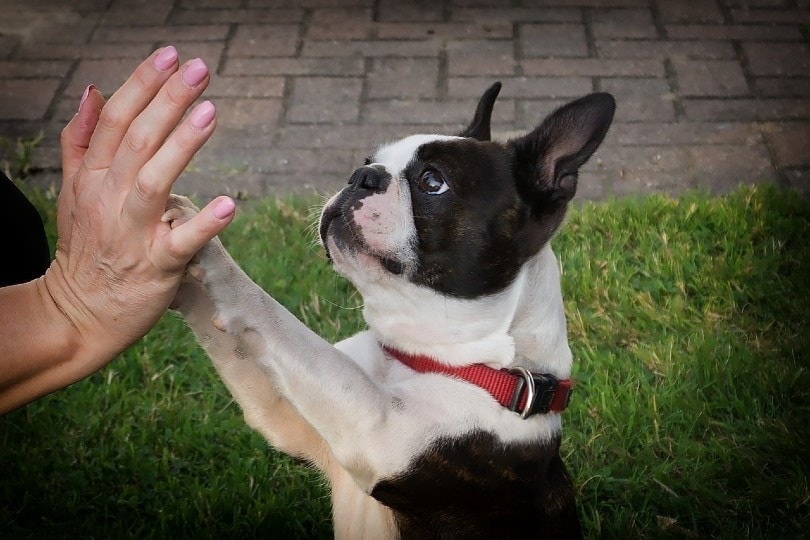
How to Groom Boston Terriers
Regularly grooming your Boston Terrier can help keep their coat in good condition, reduce the risk of parasites (like ticks and fleas), and help them stay clean and comfortable. Here are a few tips to keep your terrier clean and parasite-free.
Brush Their Coat Weekly
The first step in grooming your Boston Terrier is to brush their coat regularly. Use a soft-bristled brush to remove any knots, debris, or layered mats from their coat. Brushing their coat will also help to evenly spread their natural oils throughout their coat to help keep it looking healthy and shiny.
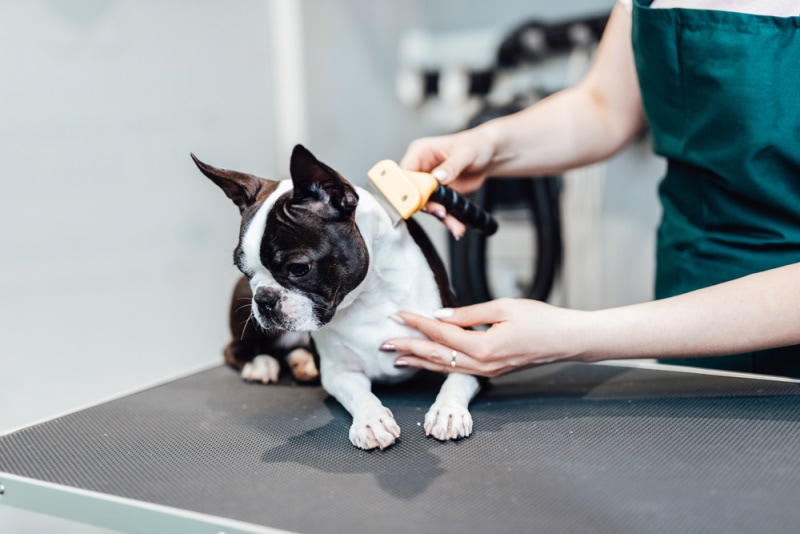
Clean Their Ears
Boston Terriers have long pointy bat-like ears that can be prone to infection if not kept clean. Check your Boston Terrier’s ears every 3-4 days to make sure they’re free of any swelling (or signs of irritation), scratches, fleas, or debris. If you notice any signs of infection, such as a bad smell or redness, then you should take your dog to the vet for treatment. You can clean their ears with a dog ear cleaning solution like Virbac Epi-Otic, which you can purchase online or at your local pet store.
You can clean their ears with a dog ear cleaning solution; however, it’s important to have their ears looked over by your veterinarian first, as many over-the-counter cleaning solutions are not intended to treat issues, such as excessive ear dirt, mites, or other infections involving the ear. They can also be harmful in situations where your pup’s inner ear has issues.
Trim Their Nails
The third step in grooming your Boston Terrier is to trim their nails. You should do this every 3-4 weeks, or as needed. It’s important to use the right tools to make sure you do not cut too short and cause your dog pain. Nail trimmers are pretty easy to find, and it’s best to use ones fitted for smaller dogs.

Bathing
And of course, there is bathing. Most Boston Terriers take well to baths, but then again, every dog is different. Use a mild dog shampoo and warm water and be sure to rinse their coat thoroughly to avoid skin irritation and dry fur. After bathing, you should make sure to thoroughly dry their coat to prevent any skin issues. The cool thing about bathing Boston Terriers is that they are super small, so bathing them requires less strength and isn’t as laborious as it may be with larger dogs – though young pups may squirm quite a bit.
Common Health Issues With the Breed
Like other canines, Boston Terriers are prone to certain health issues that potential owners should be aware of. Let’s look at a few examples below. Please note that these are just examples and not a comprehensive list of issues your pup might experience. With proper care and responsible pet ownership, they may, in fact, not face these issues!

Eye Problems
Eye issues are somewhat common in Boston Terriers. Examples of such issues include entropion and ectropion, both of which involve the eyelid rolling in or out. This can lead to pain and irritation, as well as vision problems. Other eye problems include distichiasis – a condition where eyelashes grow in the wrong direction and irritate the eye – and cataracts.
Respiratory Problems
Boston Terriers can also have respiratory issues, such as brachycephalic airway syndrome. This condition is caused by a short muzzle, which can lead to difficulty breathing. In turn, this predisposes the breed to additional issues involving their airways. It’s important to have your Boston Terrier checked by a veterinarian periodically for any signs of respiratory ailments.
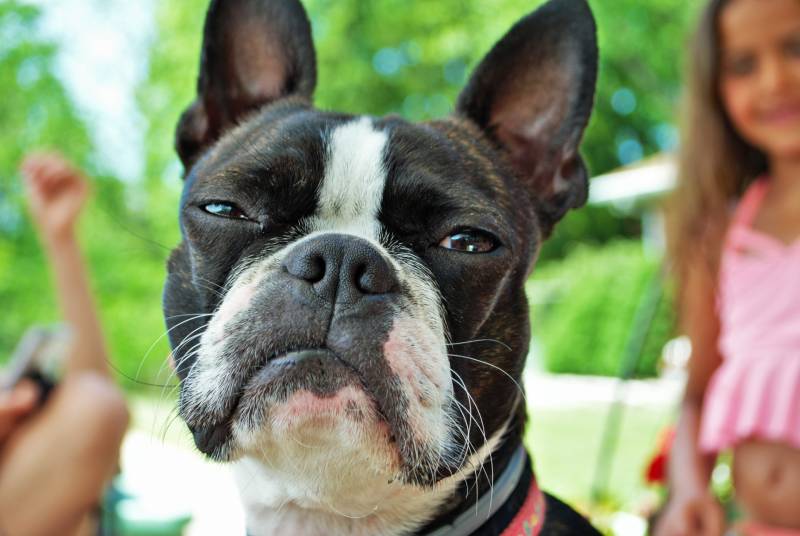
Knee Issues
Current breed standards recommend a patella (knee) examination by a veterinarian for Boston Terriers, as they are prone to having issues with this particular joint.
Wrapping Things Up
Boston Terriers are known for their short and stocky build, and they are in fact born with tails. But their tail is naturally very short due to a genetic mutation. Nonetheless, these dogs do make fantastic pets and their short tails shouldn’t discourage you from adopting one if your heart is set on it!
Featured Image Credit: J C, Pixabay





